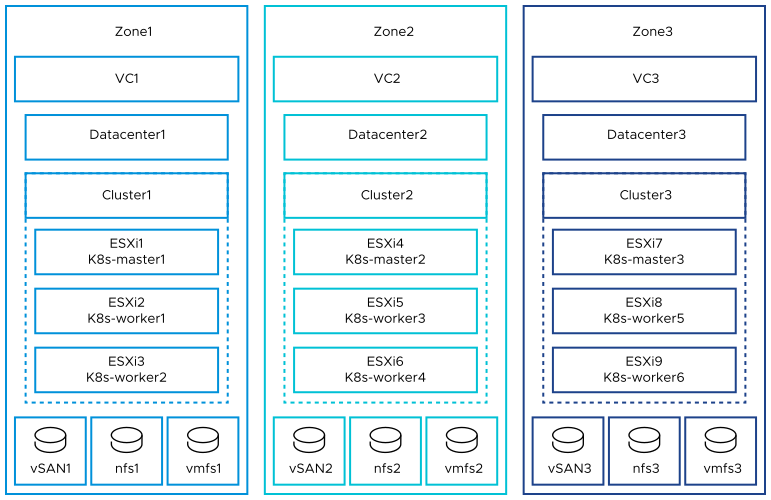vSphere Container Storage Plug-in supports volume provisioning in an environment with multiple vCenter Server instances. As a result, you can provision volumes in a native Kubernetes cluster that spans across multiple vCenter Server instances.
In the following diagram, the Kubernetes cluster spans across three vCenter Server instances that represent different availability zones. Kubernetes control plane nodes and worker nodes are distributed across these three zones. A volume provisioning request with zone1, specified in a topology requirement, provisions the volume on vSAN1 or VMFS1 datastore connected to VC1.

Requirements and Limitations
Before deploying a workload in the configuration with multiple vCenter Server instances, deploy vSphere Container Storage Plug-in with topology.
Dynamic Volume Provisioning
To provision volumes and workloads dynamically in the environment with multiple vCenter Server instances, follow the same steps required for provisioning topology-aware volumes. For more information on topology-aware volume provisioning, see Topology-Aware Volume Provisioning.
- In the storage class, specify topology segments, such as regions or zones, for only a single vCenter Server.
If topology segments in the storage class span across more than one vCenter Server, provisioning of a corresponding volume fails.
kind: StorageClass
apiVersion: storage.k8s.io/v1
metadata:
name: example-multi-zones-sc
provisioner: csi.vsphere.vmware.com
allowedTopologies:
- matchLabelExpressions:
- key: topology.csi.vmware.com/k8s-zone
values:
- zone-1
Static Volume Provisioning
- Static Volume Provisioning for File Volumes
-
To provision file volumes statically in an environment with multiple
vCenter Server instances, follow the same steps required for provisioning static file volumes in a single
vCenter Server. See
Statically Provision File Volumes with vSphere Container Storage Plug-in.
The CSI driver can identify the vCenter Server where the backing file share is located and create a CNS volume for the same.
- Static Volume Provisioning for Block Volumes
-
To provision block volumes statically in the environment with multiple vCenter Server instances, follow the same steps required for provisioning topology-aware volumes. For more information on topology-aware volume provisioning, see Topology-Aware Volume Provisioning.
Specify affinity rules for a PersistentVolume object in the nodeAffinity section. The affinity rules indicate the topology segment and vCenter Server, to which the volume belongs. If you do not specify the affinity rules the in PersistentVolume object, volume registration fails.
Use the following example, to provision a PersistentVolume object on VC-2 in the environment represented by the diagram.apiVersion: v1 kind: PersistentVolume metadata: name: static-pv-name annotations: pv.kubernetes.io/provisioned-by: csi.vsphere.vmware.com labels: static-pv-label-key: static-pv-label-value # This label is optional, it is used as a selector to bind with volume claim. This can be any unique key-value to identify PV. spec: capacity: storage: 2Gi accessModes: - ReadWriteOnce persistentVolumeReclaimPolicy: Delete claimRef: namespace: default name: static-pvc-name csi: driver: "csi.vsphere.vmware.com" volumeAttributes: type: "vSphere CNS Block Volume" volumeHandle: "0c75d40e-7576-4fe7-8aaa-a92946e2805d" # First Class Disk (Improved Virtual Disk) ID nodeAffinity: required: nodeSelectorTerms: - matchExpressions: - key: topology.csi.vmware.com/k8s-zone operator: In values: - zone-2